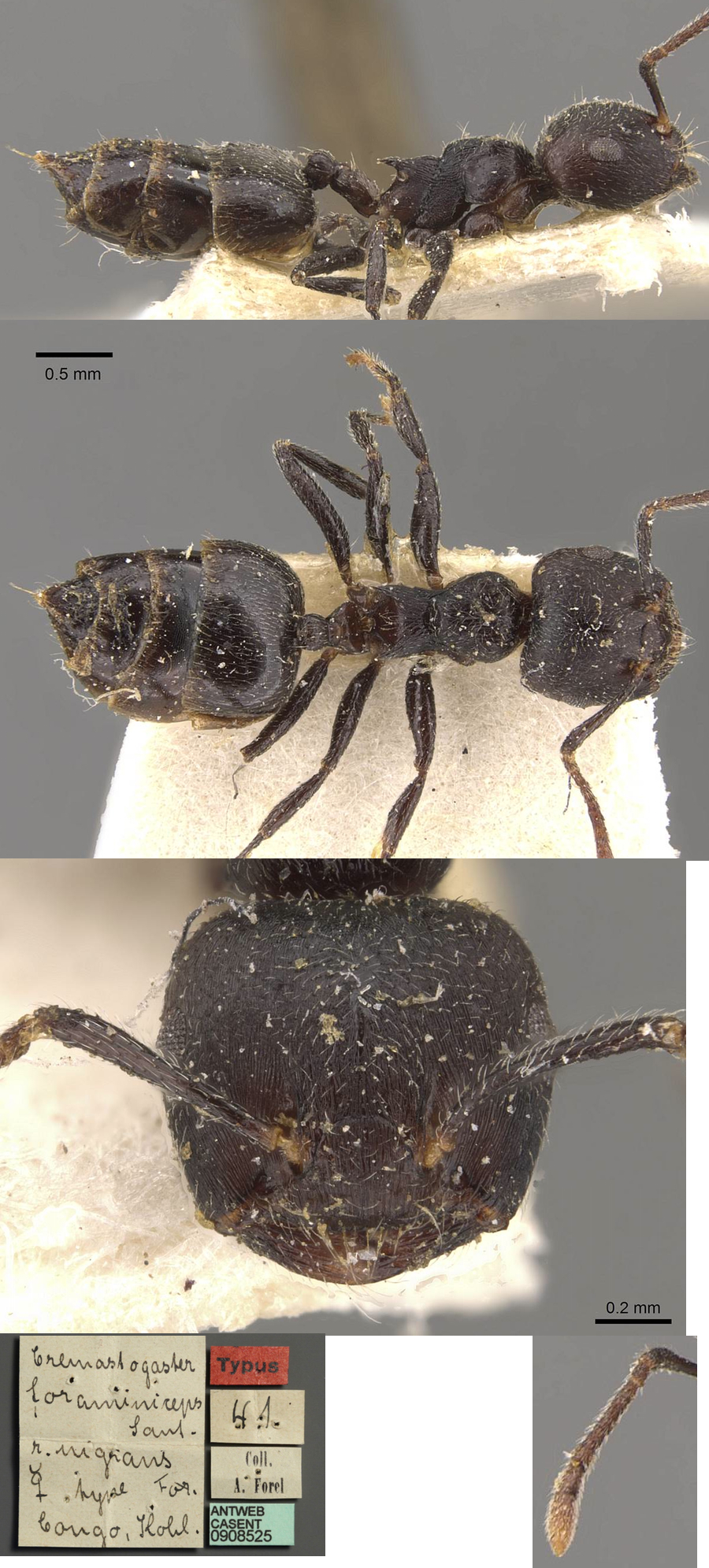Crematogaster (Sphaerocrema) nigrans Forel - new
subgenus placement
  Type location Zaïre (Cremastogaster
foraminiceps Sant. r. nigrans n. st., Forel, 1915c: 338,
worker & queen; raised to species by Santschi, 1921c: 117, misspelt
nigricans), collected at St Gabriel, by Kohl - see
below Type location Zaïre (Cremastogaster
foraminiceps Sant. r. nigrans n. st., Forel, 1915c: 338,
worker & queen; raised to species by Santschi, 1921c: 117, misspelt
nigricans), collected at St Gabriel, by Kohl - see
below
worker
and
queen described (see Bolton, 1995)  . .
|
Forel' s (1915c) description of nigrans was -
WORKER: TL 3.5-4.2 mm; almost entirely black, with appendages dark
brown, distinguishing it from Crematogaster
foraminiceps and godfreyi
[godefreyi a strips of Crematogaster
sjostedti]. Petiole considerably
wider with sides with anterior prominences well developed and rounded;
wider than long. Postpetiole whole, as in Crematogaster
kneri, without a
longitudinal notch or posterior scalloping. Other aspects as in the
type, propodeal spines a little narrower but as long as the type.
FEMALE: TL 8.6 mm; dark brown with funiculi, tarsi and sides of head
and thorax reddish; propodeum with no more than obtuse tubercles; wings
with rust tint; sculpture feebler than workers; hair pits on head much
more effaced.
Collected from a hollow branch at St. Gabriel, Kisangani, Zaïre, by
Kohl.
Santschi (1921c: 117), was writing about Crematogaster
(Sphaerocrema) phoenix and had that as (my translation) "close
to Cr. nigricans (= Cr. foraminiceps Sants st. nigricans
Forel) but that, which may be a Sphaerocrema, has sculpture
like that of foraminiceps, i.e. more feeble, more irregularly
striate and the eyes set further forward.
Reading Forel's description, i.e. postpetiole whole as
in kneri
(also a Sphaerocrema), suggests this is misplaced as regards
the subgenus but the petiole is divided, being so dark the angle of
lighting can seem to hide the division.
|
 The
photomontage of the type worker is collated from http://www.antweb.org/specimen.do?name=casent0908525 The
photomontage of the type worker is collated from http://www.antweb.org/specimen.do?name=casent0908525
|
Oxford University Museum
specimens
(previously identified by me as Cr. impressiceps)
Crematogaster (Crematogaster) nigrans
B Taylor det. |
Cameroun
G Debout & A Dalecky
Cameroon 59
|
10.iv.2001
EBO
2°33.97' N
9°50.62' E
|
70 m from village;
flat terrain, nest in a tree
|
4
|
 |
|
 The
photomontage is of workers collected in Cameroun
- south-western tropical coastal forest area between Edéa and Campo;
McKey Wolbachia project (Cameroon 59). The
photomontage is of workers collected in Cameroun
- south-western tropical coastal forest area between Edéa and Campo;
McKey Wolbachia project (Cameroon 59).
These are dimorphic. The head and body with dense fine
longitudinal striations; the gaster is coriaceous and dull. The
mandibles are coarsely striated, with puncturation close to the apical
margin. Clypeus with fairly coarse striations. Head in full face view
square but impressed behind and with a distinct medial smooth line. Eye
flat and ovoid with a narrower lower apex. Antennal funiculus distinct
- segments 2-7 resembling slightly elongate beads, distinct club with
apical segment largest. Colour all over dark reddish-brown; antennal
club pale yellow to near white. Dense decumbent pilosity all over, some
fine erect hairs on anterior of head, pronotal angles and propodeum. In
profile alitrunk domed, highest on mesonotum which has a distinct
median carina, but in the form of a central line and not pronounced or
protruding as in Atopogyne. Propodeal spines fairly short,
acute and downturned at tips.
|

|
|